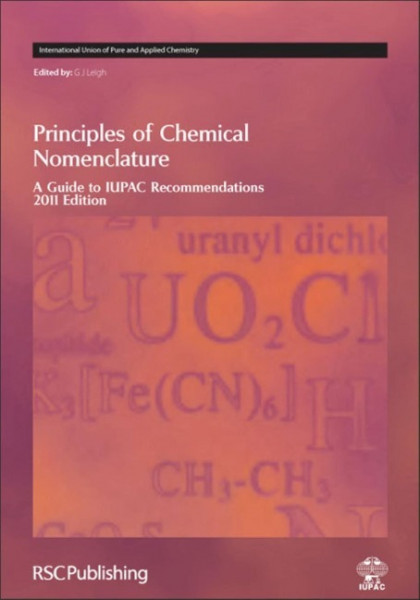
Principles of Chemical Nomenclature
Kurzinformation
inkl. MwSt. Versandinformationen
Lieferzeit 1-3 Werktage
Lieferzeit 1-3 Werktage

Beschreibung
Precise and accurate nomenclature is a vital aspect of chemistry. IUPAC nomenclature provides unequivocal names for all kinds of chemical structures. This requires a rational basis from which comprehensible names can be developed. Written by leading world authorities, Principles of Chemical Nomenclature enables teachers and students to obtain a sound training in IUPAC nomenclature. It outlines IUPAC recommendations for application in the principle branches of chemistry: organic, inorganic, organometallic, and polymer. It also includes some basic biochemical nomenclature. The book clearly explains the fundamental principles of nomenclature methods and enables the reader to apply them accurately and with confidence. The book is replete with examples for guidance and there are extensive tables to direct the reader to information quickly. The new edition takes a slightly different approach to the original. Discussions of other nomenclatures used in specific industries have been added. These include the IUPAC International Chemical Identifier (InChI) and the Preferred IUPAC Names (PINs). Nomenclature, just like chemistry, is a subject that develops continually. New classes of compound require new adaptations of nomenclature and IUPAC tries to provide these. The changes in IUPAC recommendations since publication of the first edition have been incorporated. This expansion of coverage required additional expertise so the writing of the new edition has been divided amongst a group of specialist writers. Aimed at chemistry teachers and students at all levels, this book advises on the best presentation of formulae and chemical graphics. Although rather advanced for school pupils, their teachers will find it useful. von Leigh, Jeff
Produktdetails

So garantieren wir Dir zu jeder Zeit Premiumqualität.
Über den Autor

- Gebunden
- 1612 Seiten
- Erschienen 2013
- ROYAL SOCIETY OF CHEMISTRY

- hardcover
- 612 Seiten
- Erschienen 2011
- Elsevier

- Hardcover
- 376 Seiten
- Wiley-Blackwell

- Gebunden
- 345 Seiten
- Erschienen 2018
- Wiley-VCH

- hardcover
- 704 Seiten
- Erschienen 2017
- Wiley

- Hardcover -
- Erschienen 2007
- Wiley-VCH

- paperback -
- Erschienen 1994
- Thieme Medical Pub

- Gebunden
- 298 Seiten
- Erschienen 2021
- Wiley-VCH

- Klappenbroschur
- 946 Seiten
- Erschienen 2014
- De Gruyter

- hardcover
- 992 Seiten
- Erschienen 2020
- Wiley

- Hardcover
- 392 Seiten
- Erschienen 2008
- Cambridge University Press

- Hardcover -
- Erschienen 2005
- Wiley-VCH Verlag GmbH & Co....

- hardcover
- 682 Seiten
- Erschienen 2007
- Clarion Books

- hardcover
- 1392 Seiten
- Erschienen 2020
- Wiley

- Kartoniert
- 188 Seiten
- Erschienen 2017
- Springer Spektrum

- Gebunden
- 336 Seiten
- Erschienen 1998
- Volk und Wissen Verlag













![Grundoperationen der präparativen organischen Chemie. Eine Einführung [Unknown Binding] Grundoperationen der präparativen organischen Chemie. Eine Einführung [Unknown Binding]](https://d3k2uuz9r025mk.cloudfront.net/media/image/f5/8e/2d/1755146083_53015846216.jpg)













